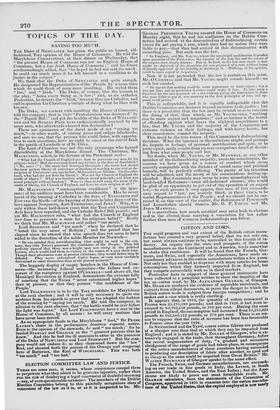TOPICS OF THE DAY.
SAYING TOO MUCH.
THE Duke of NEWCASTLE has given the public an honest, old- fashioned, Tory opinion of the House of Commons. He told the Marylebone Conservatives, at their dinner on Wednesday, that "the present House of Commons was not an English House of Commons, but a low Irish House of Commons;" and his Grace condescendingly added, that "he hoped he had not said too much. he could say much more if he felt himself in a condition to do Justice to the subject." We think that the Duke of NEWCASTLE said quite enough. He designated the Representatives of the People by a term than which he could think of none more insulting. He styled them "low," and " Irish." The Duke, of course, like the woman in the play, " hates every thing as is low ;" and, as an orthodox Protestant, lie detests the "Irish," because they are Catholics, and call in question his Christian principle of doing what he likes with his own.
The Duke, not content with insulting the House of Commons,
told the company, that in 1829 "Protestantism was destroyed" by the "Popish Bill :" and yet the healths of the Duke of WELLING- TON and Sir ROBERT PEEL were enthusiastically received by the same men, who afterwards cheered this declaration
These are specimens of' the ducal mode of not "saying too
much,"—in other words of stating gross and vulgar falsehoods; and sure we are, that the persons who could listen with approba- tion to such assertions, have no right to sneer at the lowest Irish hi the parish of Lambeth or of St. Giles. The Lord of Clumber was not the only personage who figured discreditably at the Marylebone dinner. The Chairman, Mr. MACKINNON, asked, in the fervour of his Protestant zeal— "What had the Church of England ever done to persecute any man for his religious belief? Had site
e ever immolated any victims n the fires of Smithfield ?
(" No, never !") She never had destroyed thousands; she never had denied the most perfect liberty of conscience or freedom of worship to any sect or de- scription of Christians—no, nor to Jew, Alahomedan' or Ilindoo. On the other hand, what had she not done for liberty ? Was not the Church of England the cradle of liberty ? What was freedom without moral principle, and what was moral principle without freedom ? Were we then to cast away the nurse of the cradle of liberty, the Church of England, and have no state religion at all ?"
Mr. MACKINNON'S "contemptuous confidence" in the igno- rauce of his auditory must have been considerable. Has he never heard of the burning of Catholics in the days of ELIZABETH and EDWARD the Sixth—of the burning of Arians in later days—of the laws against Nonjurors, Anti-Trinitarians, and Jews ? Why, it is only within these half-dozen years that the Test and Corporation Acts have been repealed, and the Catholic Relief Bill passed; and yet Mr. MACKINNON asks, "what had the Church of England ever done to persecute a man for his religious belief?" Really we think that Mr. MACKINNON said rather "too much."
Lord STORMONT said "too much" when he declared that he " hated the very name of Reform ;" and the period that has elapsed since he uttered that wise speech does not seem to have added to the discretion of the noble Member for Norwich- " He was satisfied that, notwithstanding what might be said to the con-
trary, they (the Tories) possessed the confidence of the People. They felt perfectly assured that there was a bright spot now rising in the political horizon, which would lead them to victory in the course of a very short time. Though their adversaries were at present victorious, they would before Jong be
defeated. They never entertained higher hopes, or were snore resolutely determined to exert themselves than at the present moment."
The beggarly display of empty benches in the House of Com- mons—the increasing Liberal majorities—the failure and ex- posure of the conspiracy against O'CONNELL—and above all, the Municipal Revolution in England, demonstrate the extreme folly of asserting that the Tories " never entertained higher hopes than at present, or that they possess "the confidence of the People." Lord TEIGNMOUTH is to be the Tory candidate for Marylebone at the next election ; and it will be only necessary to quote one sentence from his speech to prove that he too adopted the fashion of the evening by" saying too much." He told the company, in allusion to the next election, that" the battle would be over before the fight was begun." Let Lord TEIGNMOUTH have a seat in the House of Commons, by all means : he will carry motions that have never been moved.
As an appropriate finale to the Marylebone "feed," Sir PETER LAURIE'S share in the performance deserves especial notice. Even in the opinion of the stewards, he said" too much;' for he lauded STANLEY and GRAHAM as the "greatest patriots that he knew." And this he had the ill manners to utter in the presence of the Duke of NEWCASTLE and Lord STORMONT ! But the com- pany would not endure it; so they clamoured down the " low " Scot, and shouted forth the praises of the Orange and congenial hero of Battersea, the Earl of WINCHILSEA. This was both "too much" and "too bad."


























 Previous page
Previous page